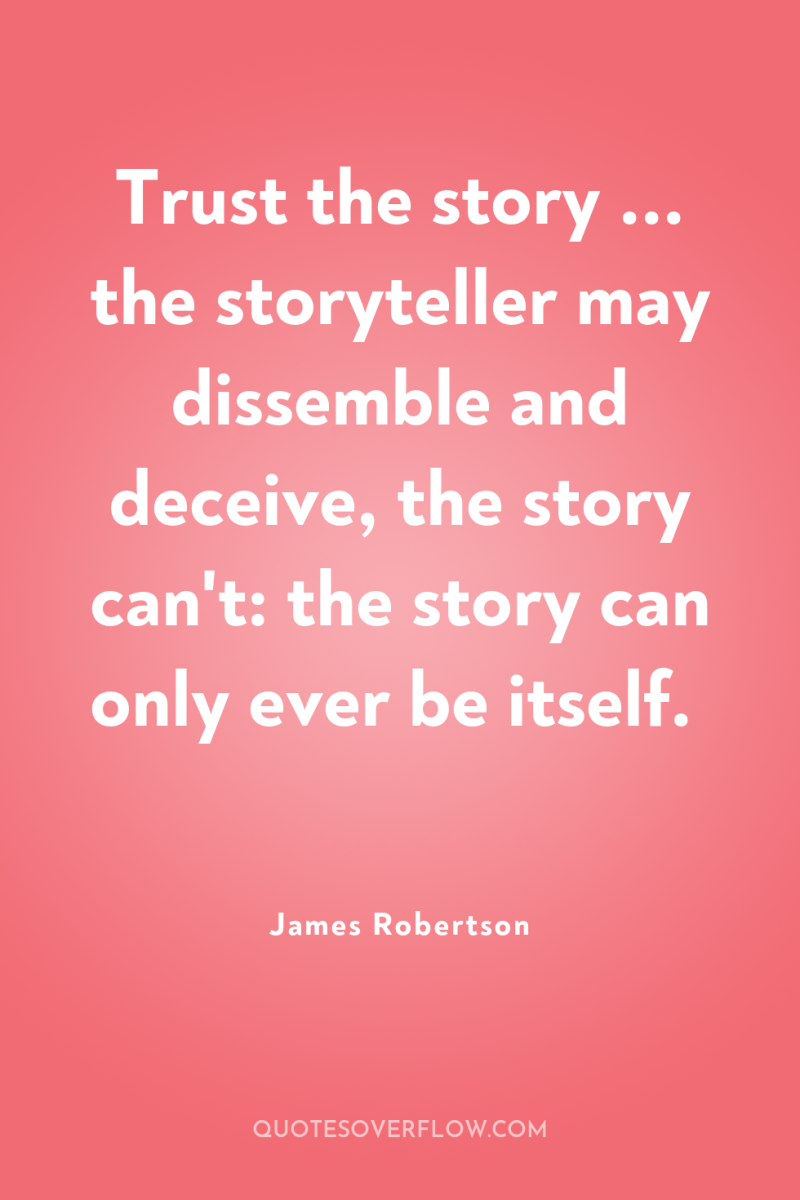
1
Trust the story ... the storyteller may dissemble and deceive, the story can't: the story can only ever be itself.James Robertson

2
I prefer the pen. There is something elemental about the glide and flow of nib and ink on paper.James Robertson
3
People think we didn't have theatres in Scotland for centuries because the Church suppressed them. Well, perhaps. But you could also argue that we had theatres in every town and village in the land: they were called kirks, and every week folk packed in to see a one-man show about life, death and the universe.James Robertson
4
Our ability to look back on the past, our need or desire to make sense of it, is both a blessing and a curse; and our inability to see into the future with any degree of accuracy is, simultaneously, the thing that saves us and the thing that condemns us.James Robertson
5
I stood staring to heaven and nothing came from there, no mercy or redemption. Whatever had come had come already and it was not sent by God. I stood, arms outstretched and empty, like a man praying but I was not praying, I was crying, because it had come to this and I had come to this place, and they were not with me... they were gone for ever.James Robertson
6
[M]ost people go through life a wee bit disappointed in themselves. I think we all keep a memory of a moment when we missed someone or something, when we could have gone down another path, a happier or better or just a different path. Just because they're in the past doesn't mean you can't treasure the possibilities. . maybe we put down a marker for another time. And now's the time. Now we can do whatever we want to do.James Robertson
7
There is something hugely civilised about allowing long pauses in a conversation. Very few people can stand that kind of silence.James Robertson
8
The wide world was changing, and she wanted a different place in it. Not just wanted, but felt she deserved. If the world didn't owe her a living, as her mother repeatedly warned her, it owed her a break. She had a strong sense that a better, more exciting, more rewarding life than that which had been the lot of her parents and grandparents was hers by right. In this she was guilty of nothing more serious than the arrogance of youth, from which every generation suffers and by which it distinguishes itself from the preceding one.James Robertson
9
Walking through a deserted city in the hours before dawn is sobering way beyond the undoing of the effects of alcohol. Every thing is familiar, and everything is strange. It's as if you are the only survivor of some mysterious calamity which has emptied the place of its population, and yet you know that behind the shuttered and curtained windows people lie sleeping in their tens of thousands, and all their joys and disasters lie sleeping too. It makes you think of your own life, usually suspended at that hour, and how you are passing through it as if in a dream. Reality seems very unreal.James Robertson
10
She was convinced the country was about to succumb to revolutionary socialism. Her own circumstances encouraged this belief: just on the edge of the really rich country set, she shared their views and opinions but lacked the financial and architechtural insulation from real or imagined political troubles. She found crushed larger cans and cigarette packets in her front garden and interpreted these as menacing signals from the Perthshire proletariat. Every flicker and dim of electric light was a portent of class war. .James Robertson